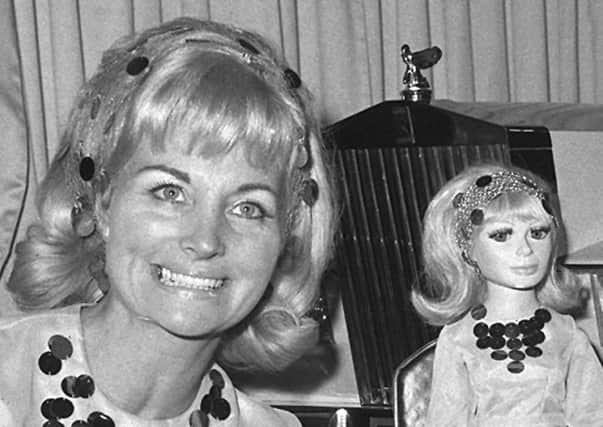Obituary: Sylvia Anderson, television producer


Sylvia Anderson was a television producer, costume designer and voice actor whose role in creating and developing a handful of Britain’s most iconic children’s television shows of the latter half of the 20th century were enmeshed in her working relationship with her former husband Gerry Anderson. Her personal website credits her as the co-creator, with Anderson, of the Supermarionation puppet shows Thunderbirds, Captain Scarlet, Stingray, Joe 90 and Fireball XL5, and the live action shows Space 1999 and UFO.
Her roles on each of the series were varied, and included character and costume designs, direction of the voice actors while overdubbing their lines, writing and co-writing scripts, and playing voice parts herself. She was both the character template and voice of Lady Penelope Creighton-Ward, the International Rescue agent and cigarette holder-toting heiress who appeared in Thunderbirds. Frequently travelling in a pink Rolls-Royce chauffeur-driven by her taciturn manservant Parker, the duo became an enduringly British double act.
Advertisement
Hide AdAdvertisement
Hide AdOriginally styled upon an image of a Vogue model, initial designs for Lady Penelope were rejected, and so the design team based the character upon Anderson without her knowledge. “We wanted a glamorous blonde and (Sylvia) was the obvious choice,” said puppet designer Mary Turner at the time. Penelope was played by Anderson with a gently unflappable whisper, a trope which lent her an endearing deadpan in fraught situations. Anderson had originally conceived of her to appeal to American viewers. “They thought everyone over here was either a Cockney or a lady living in her manor house,” she said. “Lady Penelope was both and neither.”
Anderson was born Sylvia Beatrice Thamm in South London in 1927, the daughter of a boxing promoter father and a dressmaker mother. An aspiring actor, she graduated in sociology and political science from the London School of Economics and subsequently worked both as a social worker in England and as a journalist for spell in America.
She fell into the television industry at the behest of her father, who insisted she find a new job. Finding an advert for a small production company named Polytechnic Films looking for a temporary PA, she went to the Buckinghamshire town of Taplow and took the job. Charged largely with making tea and keeping track of expenses, it was here that she met Gerry Anderson.
This was 1957, and later in the same year Gerry Anderson and his colleague Arthur Provis left to form their own company, AP Films; Sylvia also joined their board of directors, alongside colleagues John Read and Reg Hill. She already had a daughter and Anderson had a wife and family, but the pair began to court each other and wed in 1960.
Although the early years of AP were lean, they had modest successes with the kids’ series The Adventures of Twizzle and Torchy the Battery Boy – both the invention of children’s author Roberta Leigh. Around this time AP produced their first live-action feature film, the Gerry Anderson-directed Crossroads to Crime, but Anderson was intrigued by the positive response to the earlier puppet shows and created another, Four Feather Falls, for Granada. It was here that he began to experiment with Supermarionation, by which recorded voices would be lip-synched with puppet characters’ mouth movements to create a more realistic effect.
The technique caught on, and AP Films – later renamed Century 21 – went through the 1960s with hit after hit, backed by TV impresario Lew Grade. They produced Supercar (1960), Fireball XL5 (1962), Stingray (1964), Thunderbirds (1964), Captain Scarlet (1967) and Joe 90 (1968), as well as two Thunderbirds films in 1966 and 1968. They produced the first exclusively colour British kids’ TV show in Stingray, sold into America and launched successful toy and merchandising lines.
Throughout this period, Sylvia was key to the creative process often attributed solely in subsequent years to her husband. Essentially, she later indicated, Gerry devised the puppetry and came up with scenarios, while she worked on the individual characters. She fleshed out Thunderbirds’ Tracy brothers and Stingray’s mute merwoman Marina, and also gave voice to Captain Scarlet’s Melody Angel.
Their hot streak came to an end with the 1960s. Lew Grade bought AP in 1962, and as Group Three they experimented in live action like the 1969 film Doppelganger and the series The Secret Service (1969) and UFO (1970). A pioneer for women in the television industry who has only begun to receive the recognition she deserves in recent times, Anderson left Group Three after the first series of their live action sci-fi series Space:1999 in 1975. It was a decision which coincided with her separation from Gerry; they announced their split at the wrap party and divorced in 1980.
Advertisement
Hide AdAdvertisement
Hide AdSylvia later wrote a novel named Love and Hisses in 1983, worked as London talent scout for the US broadcaster HBO for 30 years, wrote the autobiography Yes M’Lady in 1991 (updated as My FAB Years in 2007), and planned a new show named The Last Station with her daughter in 2013. She died after a short illness at home and is survived by daughter Dee, son Gerry Jnr, four grandchildren and one great-grandchild.